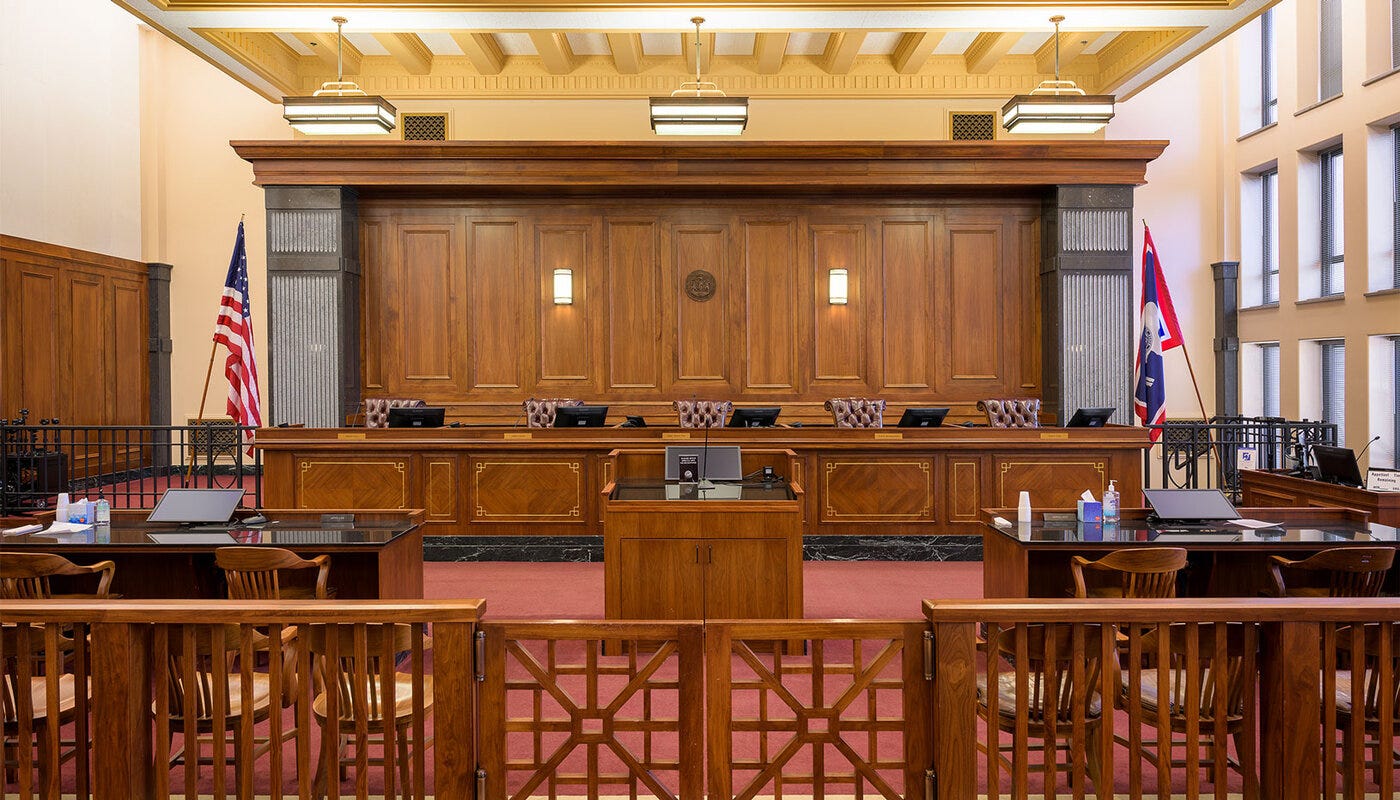Catching Up with State Courts
State courts have had a busy summer, with key rulings on abortion, guns, and environmental rights.
It’s vacation time for many Americans, but the state courts aren’t resting. The State Court Report team has been building a database of notable state supreme court rulings across the country (more on that in a minute), and we’ve noticed some interesting patterns: June has been the busiest month for rulings on significant state constitutional issues, while October and November have been the sleepiest.
State courts have been busy this August. The Illinois Supreme Court upheld a state law banning assault-style weapons, finding that it didn’t violate equal protection or constitute “special legislation” under the state constitution. (Plaintiffs had waived a Second Amendment argument.) The South Carolina Supreme Court upheld the state’s six-month abortion ban, reversing a prior decision that struck down a similar law. The Ohio Supreme Court rejected a legal challenge to a proposed abortion rights amendment, clearing the path for it to appear on the ballot in November. The Texas Supreme Court declined to temporarily halt a new law that eliminates the Harris County election administrator’s office, scheduling the case for oral argument in November. The Michigan Supreme Court relied heavily on adolescent brain research in ruling, under the totality of the circumstances, that an 18-year-old’s confession was involuntary. (Okay, technically that last one came out on July 31.)
But the biggest state court headline came from the trial courts, when a Montana judge ruled this month that a state law barring officials from considering climate change when conducting environmental impact assessments violates “the right to a clean and healthful environment” under the Montana Constitution. That case is now heading to the Montana Supreme Court.
Meanwhile, the State Court Report team has been buckling down this August as we prepare to launch some exciting new content and features this fall. Keep your eyes out for a new database of notable cases, an events series, lots of new essays and explainers . . . and a brand-new website!
IMAGE: Nagel Photography/Shutterstock
The Greening of State Constitutions
Northeastern professor Martha Davis looks at “Green Amendments” to state constitutions — like the one at issue in the Montana climate case — which provide causes of action to address environmental rights. “There is still much to be worked out as Green Amendments are considered by courts,” she notes, “including the meanings of basic terms like ‘clean’ and ‘healthful.’” READ MORE
A Conversation with Washington Supreme Court Chief Justice Steven C. González
Washington Chief Justice Steven C. González spoke with State Court Report about balls and strikes, diversity on the bench, and the role of state courts in protecting rights. Regarding constitutional interpretation, he observed, “I don’t think that originalism is elastic enough. . . . It can do violence to require someone to imagine themselves to be a slave owner who didn’t believe women had equal rights in order to understand what the Constitution means.” READ MORE
Using State Constitutional Protections to Improve Life Behind Bars
Five state constitutions guarantee that “no person arrested or confined in jail shall be treated with unnecessary rigor.” The MacArthur Justice Center’s Kathrina Szymborski Wolfkot looks at how courts in Oregon and Utah have held that these clauses offer greater protections than the federal Constitution. Against a “bleak” federal prison litigation landscape, Wolkoft writes, “state constitutions offer a glimmer of hope — and 'unnecessary rigor' clauses glow particularly brightly.” READ MORE
Scholarship Roundup: Giving State Law Its Due
University of Wisconsin professor Miriam Seifter profiles new scholarship on state courts, state constitutions, and the broader field of state public law. She writes, “States offer much to study, because state public law is not just junior varsity federal public law. States’ constitutions and institutions offer rich distinctions that warrant focused consideration.” READ MORE
Partisan Gerrymandering Litigation: Where Things Stand
Since the 2021 redistricting cycle began, partisan gerrymandering cases have been filed in 17 states. The Brennan Center’s Yurij Rudensky recaps where things stand across the country. He notes, “We can soon expect a clearer picture of which voters will have recourse against partisan abuses in redistricting and whether anti-gerrymandering becomes the dominant rule under state constitutions.” READ MORE
Get to Know Your State’s ‘Baby Ninth Amendment’
The Institute for Justice’s Anthony Sanders previews his new book on state analogues to the Ninth Amendment. He argues that by their own terms, these “Baby Ninth” amendments protect unenumerated rights, yet judges have mostly ignored them. “You wouldn’t be crazy to conclude that judges simply think Baby Ninths are a bad idea and so they don’t enforce them,” he writes. “But that’s not their choice.” READ MORE
VIRTUAL EVENT
Abortion Rights and the Future of State Constitutions
Tuesday, September 19, 6–7 p.m. ET
Join us for a live virtual panel exploring the aftermath of Dobbs and its implications for state courts and constitutions. Panelists include Cheri Beasley, former chief justice of the North Carolina Supreme Court; David Cohen, a reproductive rights scholar at Drexel University; and Alicia Bannon, director of the Brennan Center Judiciary Program and editor in chief of State Court Report. Emily Bazelon of the New York Times Magazine and Yale Law School will guide a conversation on the role of state courts in adjudicating reproductive rights cases, as well as the future of state constitutionalism. RSVP today.
Produced in partnership with the Birnbaum Women's Leadership Center






